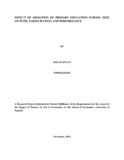| dc.description.abstract | Since the inception of Free Primary Education (FPE), the Government has made significant
investment in providing access to basic education through provision of capitation grants,
infrastructure development, teacher employment and training and provision of instructional
material. The FPE programme has seen increased pupil participation since its implementation.
Despite the effort made by the government to achieve goals of education for all and the
millennium development goal on universal primary education, a number of challenges still exist.
Among the challenges include congested classrooms, very high pupil teacher ratio in some
regions and poor learning facilities.
The paper examines the effect of abolition of primary education fees on school participation and
performance in Kenya. The study provides comparison of pupil participation and performance in
the period preceding the introduction of FPE in 2003 and after the introduction of FPE to the
year 2013. Participation is measured by the gross enrollment in primary schools while
performance is measured by the KCPE test scores over these two periods. The study uses panel
data for the period 1998-2013 from all counties in Kenya. The study uses fixed effects model to
assess the effect of abolition of fees on pupil participation and performance in KCPE
examination.
The study found that since the inception of FPE, pupil participation has increased tremendously
on one hand and national performance is still below average mark of 250. The study also found
regional disparities in terms of performance and pupil participation.
To ensure pupil participation in primary education, the study recommends removing all costs
relating to schooling so that education is completely free. To ensure equality in access to
education, the government should implement affirmative policies to bring the disadvantaged
regions at par with the rest of the country. This may include; setting up mobile schools, provision
of low cost boarding school, enhancing school feeding programmes and setting up an
equalization fund for education.
The study also recommends that the government should improve existing infrastructure by
increasing number of classrooms, textbooks and teachers to ensure improved performance. | en_US |

